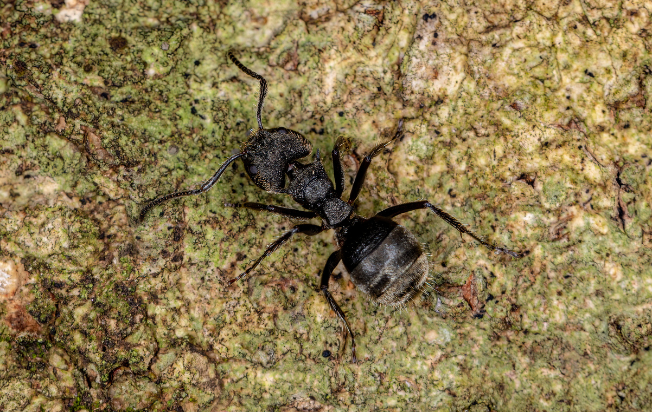Odorous House Ants: What Are They and How Do You Deal With Them?
Have you ever caught a whiff of foul-smelling coconuts in your home and wondered where the unpleasant odor originated? Well, you may have some uninvited guests – Odorous House Ants! These tiny intruders can wreak havoc in your home despite their small size.
This article will explore the world of Odorous House Ants, discussing their characteristics, dietary preferences, and what attracts them. Let’s dive right in!
Key Takeaways
- To prevent odorous ant infestations, maintain cleanliness, and promptly address food spills and moisture build-up. Store food properly, fix leaks, and ensure adequate ventilation.
- Deter ants by regularly inspecting and sealing potential entry points, such as cracks and crevices. Trim vegetation touching exterior walls or roof.
- Control odorous house ants with slow-acting insecticidal baits. Follow the manufacturer’s instructions for the most effective use.
- If DIY measures fail, consider hiring professional pest control for long-term solutions and prevention.
– – –
🐜 Get ant control in Sacramento County or San Diego County
Ant infestations will not go away on their own
Contact Us Now To Get Rid Of Them
– – –
What Are Odorous House Ants?

Characteristics
Odorous house ants, scientifically known as “Tapinoma sessile,” are a common pest found across the United States. They are small, typically measuring between 1/16th to 1/8th of an inch, with a dark brown or black color. One distinguishing feature of these ants is their unevenly shaped thorax.
However, the most notable characteristic that earned them their name is the strong, rotten, coconut-like smell they emit when crushed. Their antennae are segmented into 12 parts and end in a club with no defined petiole (the narrow waist found in some ant species).
Habitat
Odorous house ants are highly adaptable and can nest in various habitats. They are commonly found in wall voids, near heaters and water pipes, and under sinks in homes. Outside, they prefer to nest under rocks, in mulch, or within crevices. These ants are particularly attracted to areas of high moisture but aren’t shy about setting up camp in dry and heated buildings.
Their colonies can be sizable, with multiple queens and thousands of worker ants populating a single nest. Despite their small size, the ants travel extensively from their nests in search of food sources, making them a pervasive pest.
Diet
Odorous house ants aren’t too picky when it comes to their diet. They are omnivores, which means they can feed on a wide variety of food items. They have a fondness for honeydew, a sweet substance aphids produce. In indoor settings, they raid kitchens for sweet stuff – think sugary foods, fruit juices, and even your pet’s food.
But don’t let this deceive you into thinking they’re all about the sugar rush. These ants also consume other insects, making them an essential part of the ecological cycle. However, their dietary habits and ability to adapt to various environments make them a common and persistent issue for homeowners.
What Attracts Odorous House Ants?
Odorous house ants are attracted to various elements in your home, including:
- Sugary Delights: Such as fruit juices, pet food, and honeydew. These make kitchens with poorly stored food or sticky spills particularly inviting.
- Damp Areas: Leaky pipes or drains act as hotspots for these pests.
- Hiding Spots: Cracks, crevices, and voids within walls or around the home’s exterior are prime locations.
- Leftovers: Specifically, leftover pet food can lure them inside.
To prevent an infestation, it’s vital to maintain cleanliness, promptly address moisture issues, and seal potential entry points.
Are Odorous House Ants Dangerous?
While odorous house ants aren’t directly harmful to humans, they can certainly be a nuisance and disrupt your peace of mind. Unlike some ant species, they don’t sting or bite. However, their persistent presence can lead to contamination of food and kitchen surfaces with pathogenic microorganisms they might carry, given their omnivorous diet and foraging habits.
In addition, the unpleasant odor they release when crushed can create an uncomfortable environment in your home. Thus, while not dangerous in a direct sense, it’s best to act promptly upon spotting signs of an odorous house ant infestation to maintain a clean and pleasant living space.
– – –
🐜 Get ant control in Sacramento County or San Diego County
Ant infestations will not go away on their own
Contact Us Now To Get Rid Of Them
– – –
How to Prevent an Infestation
Keep Things Clean
Preventing an odorous house ant infestation primarily hinges on maintaining a clean household. Important measures include:
- Food Leftovers: Promptly clean up and store especially sugary items in airtight containers.
- Vacuuming: Regularly vacuum areas prone to crumbs or food particles, like under kitchen appliances or furniture. Remember, even a tiny crumb can be a feast for these ants.
- Pet Food: Pay attention to pet dishes. Clean up any leftover food after feeding instead of leaving it out overnight.
- Garbage Management: Ensure household garbage is stored in sealed bins and emptied routinely.
You can double up by cleaning and then implementing eco-friendly ant-repelling methods simultaneously. These tactics are far more effective when done professionally.
Seal Entry Points
One practical way to prevent an odorous house ant infestation is to eliminate their potential entry points. Inspect the exterior of your home thoroughly for cracks and crevices, especially around windows, doors, pipes, and wires. Use a suitable sealant to fill these gaps, making it difficult for ants to squeeze through.
It’s also a good idea to trim tree branches or shrubs that touch your house, as these can serve as a bridge for ants to access your home. Creating a barrier prevents odorous house ants from entering, making your home less accessible to other pests.
Trim Vegetation
Trimming vegetation around your home is another effective way to prevent an odorous house ant infestation. Ants often use tree branches and shrubs as bridges to enter your home, and tall grasses can provide a suitable environment for them to thrive.
Regularly trim trees and bushes to mitigate this so they don’t touch your exterior walls or roof. Also, keep your lawn mowed and your garden free from piles of leaves or debris. Maintaining a tidy outdoor landscape can help keep odorous house ants at bay.
Remove Attractants
Eliminating factors that attract odorous house ants is key to preventing an infestation. Essential steps include:
- Food Management: Ensure no sweet spills or leftovers in the kitchen. Secure all food items, especially sugary ones, in airtight containers.
- Pet Food Vigilance: Be mindful of pet food. Always clean up after your pet’s meals, and avoid leaving dishes out overnight.
- Moisture Control: Address any leaking pipes or faucets promptly. Ensure your home is well-ventilated to prevent moisture build-up, especially in bathrooms and kitchens.
- Secure Your Home: Remove potential nesting sites by sealing off cracks and crevices in walls, doors, and windows.
Use Ant Baits
Although natural ant repellants have their place, ant baits can effectively control ant infestations. These baits contain a slow-acting insecticide mixed with a food attractant that lures ants back to the colony.
The bait significantly reduces the ant population once distributed among the ants, including the queen. Ant baits come in various forms, like gel, granules, or stations, and can be placed near areas of high ant activity.
Patience is key, as it may take days to weeks for results. Follow the manufacturer’s instructions for application and safety, keeping baits away from children and pets. Combined with preventive measures, ant baits can help win the battle against odorous house ants.
– – –
🐜 Get ant control in Sacramento County or San Diego County
Ant infestations will not go away on their own
Contact Us Now To Get Rid Of Them
– – –
When to Call a Professional
When your DIY efforts fail to eliminate odorous house ants, it’s time to consider calling a professional pest control service. They have the expertise and tools to handle persistent infestations and can provide effective solutions to eradicate ants and prevent future problems. While it may come at a cost, professional services offer long-term peace of mind and a pest-free home.



